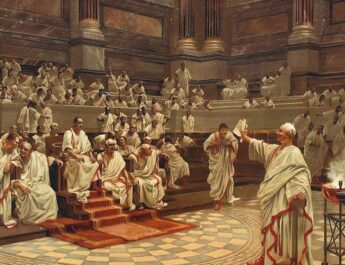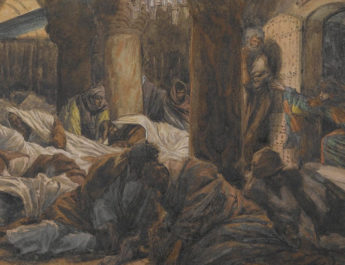Mark 6:14-29
A Women’s Lectionary 36
14 KingA HerodB heardC of it, for Jesus’ nameD had becomeE known.F
A “King” = basileus. Probably from basis (step, hence foot; a pace); from baino (to walk, to go). This is king, emperor, or sovereign.
B “Herod” = Herodes. Perhaps from heros (hero, warrior) + oide (song, ode, legend, tale); {from aoide (song, ode, legend, tale); {from aeido (to sing) + e (this is added to verbs to make them nouns)}} OR from hera (Hera) + oide (same as above). This is Herod, perhaps “hero’s song,” “Hera’s song,” or “heroic.” Seehttps://en.wiktionary.org/wiki/Herod
C “heard” = akouo. This is hear or listen, but it also means to understand by hearing. This is where the word “acoustics” comes from.
D “name” = onoma. May be from ginosko (know, recognize, learn from firsthand experience). This is a name, authority, cause, character, fame, reputation. The name was thought to include something of the essence of the person so it was not thought to be separate from the person.
E “become” = ginomai. This is to come into being, to happen, become, be born. It can be to emerge from one state or condition to another or is coming into being with the sense of movement or growth.
F “known” = phaneros. 18x in NT. From phos (light, a source of light, fire, or radiance; light with specific reference to what it reveals; luminousness whether natural or artificial, abstract or concrete, literal or figurative); from phao (to shine or make visible, especially with rays of light); from the same as phaino (to bring light, cause to appear, shine, become visible or clear). This is visible, apparent, clear, shining.
Some were saying, “JohnG the baptizerH has been raisedI from the dead;J and for this reason these powersK are at workL in him.”
G “John” = Ioannes. From Hebrew yochanan (Johanan); from Yehochanan (“the Lord has been gracious”); {from YHVH (proper name of the God of Israel); {from havah (to become); from hayah (to be, exist, happen)} + chanan (beseech, show favor, be gracious; properly, to bend in kindness to someone with less status). This is John, meaning “the Lord has been gracious.”
H “baptizer” = baptizo. From bapto (to dip or dye; to entirely cover with liquid, to stain). This is to submerge, wash, or immerse. Used specially for baptism.
I “raised” = egeiro. This is to awake, raise up or lift up. It can be to get up from sitting or lying down, to get up from sleeping, to rise from a disease or from death. Figuratively, it can be rising from inactivity or from ruins.
J “dead” = nekros. Perhaps from nekus (corpse). This is dead of lifeless, mortal, corpse. It can also be used figuratively for powerless or ineffective. It is where the word “necrotic” comes from.
K “powers” = dunamis. From dunamai (to be able, have power or ability). This is might, strength, physical power, efficacy, energy, and miraculous power. It is force literally or figuratively – the power of a miracle or the miracle itself.
L “are at work” = energeo. From energes (active, effective, operative, energized, powerful); {from en (in, at, by, with, among) + ergon (word, task, action, employment); {from ergo (to work, accomplish) or from erdo (to do)}}. This is to be at work, accomplish, be mighty or effectual. This is where “energy” comes from.
15 But othersM said, “It is Elijah.”N
And others said, “It is a prophet,O like one of the prophets of old.”
16 But when Herod heard of it, he said, “John, whom I beheaded,P has been raised.”
M “others” = allos. This is other, another. Specifically, it is another of a similar kind or type. There is a different word in Greek that speaks of another as a different kind (heteros).
N “Elijah” = Elias. Related to “John” in v14. From Hebrew Eliyyah (Elijah) {from el (God, god) + Yah (the shortened form of the name of the God of Israel; God, Lord); {from YHVH (see note G above)}. This is Elijah, “The Lord is God.”
O “prophet” = prophetes. Related to “known” in v14. From pro (before, in front of, earlier than) + phemi (to declare, say, use contrasts in speaking to shed light on one point of view); {from phao (see note F above) or phaino (see note F above)}. This is a prophet or poet – one who speaks with inspiration from God.
P “beheaded” = apokephalizo. 4x in NT – all in reference to the death of John the Baptist. From apo (from, away from) + kephale (head or chief; literal head or, figuratively, a ruler or lord, corner stone); {from kapto (to seize)}. This is to behead or decapitate.
17 For Herod himself had sentQ men who arrestedR John, boundS him, and put him in prisonT on account of Herodias,U
Q “sent” = apostello. From apo (from, away from) + stello (to send, set, arrange, prepare, gather up); {probably from histemi (to make to stand, stand, place, set up, establish, appoint, stand firm, be steadfast)}. This is to send forth, send away, dismiss, send as a messenger. It implies one that is sent for a particular mission or purpose rather than a quick errand. This is where “apostle” comes from.
R “arrested” = krateo. From kratos (strength, power, dominion; vigor in a literal or figurative sense; power that is exercised). This is being strong or mighty so, by extension, to prevail or rule. It can also mean to seize, grasp hold of and thereby control. In this sense, it means arrest.
S “bound” = deo. To tie, bind, compel, put in chains. This is to bind in a literal or figurative sense. Can also mean declaring something unlawful.
T “prison” = phulake. From phulasso (to guard something so that it doesn’t escape – to watch over it vigilantly; being on guard in a literal or figurative sense); related to phulaks (military guard, sentry, watcher). This is the act of guarding, the person who guards, the place where guarding occurs (i.e. a prison), or the times of guarding (the various watches).
U “Herodias” = Herodias. Related to “Herod” in v14. 6x in NT. From Herodes (see note B above). This is Herodias, the female form of Herod, perhaps meaning “hero’s song” or “heroic.”
his brotherV Philip’sW wife,X because Herod had marriedY her.
V “brother” = adelphos. From a (with, community, fellowship) + delphus (womb). This is a brother in a literal or figurative sense. It is also used of another member of the Church.
W “Philip’s” = Philippos. From philos (dear, beloved, a friend, an associate; friendship with personal affection, a trusted confidante; love from personal experience with another person) + hippos (horse). This is Philip, meaning one who loves horses or is fond of horses.
X “wife” = gune. Related to “become” in v14. Perhaps from ginomai (see note E above). This is woman, wife, or bride. This is where the word “gynecologist” comes from.
Y “married” = gameo. From gamos (a wedding, whether the ceremony, the feast, or the marriage itself). This is to marry.
18 For John had been telling Herod, “It is not lawfulZ for you to haveAA your brother’s wife.”
19 And Herodias had a grudgeBB against him, and wantedCC to killDD him. But she couldEE not,
Z “is…lawful” = exesti. From ek (out, out of) + eimi (to be, exist). This is what is permitted or what is allowed under the law. It can mean what is right, what holds moral authority, or, more broadly, something that is shown out in public.
AA “have” = echo. This is to have, hold, possess.
BB “had a grudge” = enecho. Related to “have” in v18. 3x in NT. From en (in, on, at, by, with) + echo (to have, hold, possess). This is to hold in, ensnare. It can refer to anger, hostility, or holding a grudge.
CC “wanted” = thelo. This is to wish, desire, will, or intend. It is to choose or prefer in a literal or figurative sense. It can also mean inclined toward or take delight in. It can have a sense of being ready to act on the impulse in question.
DD “kill” = apokteino. From apo (from, away from) + kteino (to kill). To put to death, kill, slay. Figuratively, this word can mean abolish, destroy, or extinguish.
EE “could” = dunamai. Related to “powers” in v14. See note K above.
20 for Herod fearedFF John, knowingGG that he was a righteousHH and holyII man,JJ
FF “feared” = phobeo. From phobos (panic flight, fear, fear being caused, terror, alarm, that which causes fear, reverence, respect); from phebomai (to flee, withdraw, be put to flight). This is also to put to flight, terrify, frighten, dread, reverence, to withdraw or avoid. It is sometimes used in a positive sense to mean the fear of the Lord, echoing Old Testament language. More commonly, it is fear of following God’s path. This is where the word phobia comes from.
GG “knowing” = eido. This is to know, consider perceive, appreciate, behold, or remember. It means seeing with one’s eyes, but also figuratively, it means perceiving – seeing that becomes understanding. So, by implication, this means knowing or being aware.
HH “righteous” = dikaios. From dike (the principle of justice; that which is right in a way that is very clear; a decision or the execution of that decision; originally, this word was for custom or usage; evolved to include the process of law, judicial hearing, execution of sentence, penalty, and even vengeance; more commonly, it refers to what is right); may be from deiknumi (to show, point out, exhibit; figurative for teach, demonstrate, make known). This is correct, righteous, just, or a righteous person. It implies innocent or conforming to God’s standard of justice.
II “holy” = hagios. From hagnos (holy, sacred, pure ethically, ritually, or ceremonially; prepared for worship, chaste, unadulterated, pure to the core; undefiled by sin; figurative for innocent, modest, perfect). God is totally different from humanity and thus set apart. That which is consecrated to worship God (elements of worship) or to serve God (as the saints) are holy because they are now set apart for God’s purposes. Holy because important to God. This is sacred physically, pure. It can be morally blameless or ceremonially consecrated.
JJ “man” = aner. This is man, male, husband, or fellow. It can also refer to an individual.
and he protectedKK him. When he heard him, he was greatly perplexed;LL and yet he likedMM to listen to him.
KK “protected” = suntereo. 3x in NT. From sun (with, together with) + tereo (to guard, observe, keep, maintain, or preserve; figuratively, spiritual watchfulness; guarding something from being lost or harmed; fulfilling commands, keeping in custody, or maintaining; figuratively can mean to remain unmarried.); { teros (a guard or a watch that guards keep); perhaps related to theoreo (gazing, beholding, experiencing, discerning; looking at something to analyze it and concentrate on what it means; the root of the word “theatre” in that people concentrate on the action of the play to understand its meaning); from theaomai (to behold, look upon, see, contemplate, visit); from thaomai (to gaze at a spectacle; to look at or contemplate as a spectator; to interpret something in efforts to grasp its significance); from theoros (a spectator or envoy)}. This is to keep close, preserve, remember and obey, treasure.
LL “was…perplexed” = aporeo. 6x in NT. From a (not) + poros (way, resource, passageway); {related to poreuomai (to go, travel, journey, or die; transporting things from one place to another and focuses on the personal significance of the destination)}. This is feeling like you have no way out, being perplexed or doubting.
MM “liked” = hedeos. 3x in NT. From hedus (sweet) or from hedone (pleasure, passion – particularly of physical senses); {from hedomai (to enjoy oneself); from handano (to please)}. This is sweetly, gladly, enjoyable, with pleasure.
21 But an opportunityNN came when Herod on his birthdayOO gavePP a banquetQQ
NN “opportunity” = hemera + eukairos. Literally “opportune day.” Hemera is perhaps from hemai (to sit). It is a day, time, or daybreak. Eukairos is 2x in NT. From eu (good, well, well done, rightly) + kairos (season, opportunity, occasion; spiritually significant time – the right time or appointed time). This is timely, suitable, strategic, well-timed, opportune, a festival.
OO “birthday” = genesia. Related to “become” in v14 & “wife” in v17. 2x in NT. From genesis (origin, lineage, life, nativity, nature, generation); from ginomai (see note E above). This is a birthday celebration.
PP “gave” = poieo. This is to make, do, act, construct, abide, or cause.
QQ “banquet” = deipnon. 16x in NT. From the same as dapane (cost or expense); from dapto (to devour). This is a dinner or a feast – a meal in the afternoon or, more commonly, the evening.
for his courtiersRR and officersSS and for the leadersTT of Galilee.UU
RR “courtiers” = megistan. 3x in NT. From megistos (greatest, magnificent); from megas (big in a literal or figurative sense – great, large, exceeding, abundant, high, mighty, perfect, strong, etc). This is a great one, noble, courtier, grandee.
SS “officers” = chiliarchos. From chilioi (thousand literal and figurative; can mean total inclusion) + archos (chief, leader); {from archo (to rule, begin, have first rank or have political power)}. This is chiliarch – one who commands a thousand.
TT “leaders” = protos. From pro (before, first, in front of, earlier). This is what is first, which could be the most important, the first in order, the main one, the chief.
UU “Galilee” = Galilaia. From Hebrew galil (cylinder, circuit, district); from galal (to roll in a literal or figurative sense, roll away, roll down, wallow, remove, trust). This is Galilee, meaning perhaps region or cylinder.
22 When his daughterVV Herodias came in and danced,WW she pleasedXX Herod and his guests;YY and the king said to the girl,ZZ “AskAAA me for whatever you wish,BBB and I will give it.”
VV “daughter” = thugater. This is daughter, a related female or one who lives with you.
WW “danced” = orcheomai. 4x in NT. Perhaps from orchos (a row, ring). This is to dance with repeated motion.
XX “pleased” = aresko. 17x in NT. Root means to fit together. This is to please or be agreeable. It implies voluntarily serving others, satisfying others, or making good to win their favor or approval. It is often used for moral agreement. It can mean being agreeable or trying to be agreeable. Used 9x of pleasing people in a negative way, 5x of pleasing people in a positive way, and 3x of pleasing God.
YY “guests” = sunanakeimai. 7x in NT. From sun (with, together with) + anakeimai (to recline, particularly as one does for dinner; also reclining as a corpse); {from ana (up, again, back, among, between, anew) + keimai (to lie, recline, be set, appointed, destined; to lie down literally or figuratively)}. This is to dine, recline at a table with someone else, a dinner guest, the table itself.
ZZ “girl” = korasion. 8x in NT– 4x of the girl restored to life & 4x of Salome. From kore (maiden). This is a little girl or maiden.
AAA “ask” = aiteo. This is to ask, demand, beg, desire.
BBB “wish” = thelo. Same as “wanted” in v19. See note CC above.
23 And he solemnly sworeCCC to her, “Whatever you ask me, I will give you, even half of my kingdom.”DDD
24 She went out and said to her mother, “What should I ask for?”
She replied, “The headEEE of John the baptizer.”
25 ImmediatelyFFF she rushedGGG back to the king and requested,HHH “I want you to give me at onceIII the head of John the BaptistJJJ on a platter.”KKK
FFF “immediately” = eutheos. Related to “opportunity” in v21. From euthus (immediately, upright, straight and not crooked); {perhaps from eu (see note NN above) + tithemi (to place, lay, set, establish)}. This is directly, soon, at once.
GGG “rushed” = spoude. 12x in NT. From speudo (to hurry, urge on, await); probably from pous (foot in a figurative or literal sense). This is haste, diligence, earnestness, effort. It is being swift to demonstrate one’s enthusiasm. It is doing what one is told right away and with full effort.
HHH “requested” = aiteo. Same as “ask” in v22. See note AAA above.
III “at once” = exautes. 6x in NT. From ek (from, from out of) + autos (he, she, self, they, same). Literally “from that one,” with the sense of “from that hour.” So, it is at once, immediately.
JJJ “Baptist” = baptistes. Related to “Baptizer” in v14. 12x in NT. From baptizo (see note H above). This is baptizer or Baptist. The term is only used for John the Baptist.
KKK “platter” = pinax. 5x in NT. Perhaps from plax (something flat and broad, stone tablet); from plasso (to form, mold; to create like a potter shapes clay). This is a dish, platter, disc, board, or charger.
26 The king wasLLL deeply grieved;MMM yet out of regard for his oathsNNN and for the guests,OOO he did not want to refusePPP her.
LLL “was” = ginomai. Same as “become” in v14. See note E above.
MMM “deeply grieved” = perilupos. 5x in NT – including 2x when Jesus prays in Gethsemane in Matthew and Mark. From peri (about, concerning, all around, encompassing) + lupe (pain, whether physical or mental; grief, sorrow, distress, a heavy heart). This is very sorrowful, deeply grieved.
NNN “oaths” = horkos. 10x in NT. Related to erkos (fence, enclosure); perhaps related to horion (boundary, territory); from horos (limit, boundary). This is an oath or vow. It is something with limits, done for a sacred purpose.
OOO “guests” = anakeimai. Related to “guests” in v22. 14x in NT. See note YY above.
PPP “refuse” = atheteo. Related to “immediately” in v25. 16x in NT. From athetos (not having position or place); {from a (not) + tithemi (see note FFF above)}. This is setting something aside, ignoring or nullifying it, refusing or rejecting. It can also mean to annul or cancel out the effect of something. Literally, this is to un-place. It can also be rejecting something, despising it, or considering something invalid.
27 Immediately the king sent a soldier of the guardQQQ with ordersRRR to bringSSS John’s head. He went and beheaded him in the prison, 28 brought his head on a platter, and gave it to the girl. Then the girl gave it to her mother.
QQQ “soldier of the guard” = spekoulator. 1x in NT. From Latin speculator (“a spy, explorer, investigator”; one of the legion or who worked for the governor to do executions); from specular (to watch, spy); from specula (watchtower, lookout); from specio (to observe). This is a scout, spy, guard, executioner. It shares a root with the word “speculate.” See https://en.wiktionary.org/wiki/speculator
RRR “with orders” = epitasso. 10x in NT. From epi (on, upon, to, against, what is fitting) + tasso (to arrange, appoint, determine). This is to arrange, command, charge, order. It is a command that brings things into their proper order – so that they fit together.
SSS “bring” = phero. This is to bear, bring, lead, or make known publicly. It is to carry in a literal or figurative sense.
29 When his disciplesTTT heard about it, they came and tookUUU his body,VVV and laidWWW it in a tomb.XXX
TTT “disciples” = mathetes. From matheteuo (to make a disciple of); from manthano (to learn key facts, gain knowledge from experience; generally implies reflection as part of the learning process); from math– (thinking things through). This is a disciple, learner, or student. It is where we get “mathematics” from.
UUU “took” = airo. This is to lift up in a literal or figurative sense. So, it could mean to lift, carry, or raise. It could also imply lifting something in order to take it away or remove it. Figuratively, this can be used for raising the voice or level of suspense. It can mean sailing off as raising the anchor. It can also correspond to a Hebrew expression for atonement of sin (lift/remove sin).
VVV “body” = ptoma. 7x in NT. From pipto (to fall literally or figuratively). This is a fall, misfortune, ruin, corpse.
WWW “laid” = tithemi. Related to “immediately” in v25 & “refuse” in v26. See note FFF above.
XXX “tomb” = mnemeion. From mousikos (to remember); from mneme (memory or mention); from mnaomai (to remember; by implication give reward or consequence); perhaps from meno (to stay, abide, wait, endure). This is properly a memorial – a tomb, grave, monument.
Image credit: “John the Baptist in Prison” by LUMO Project.




